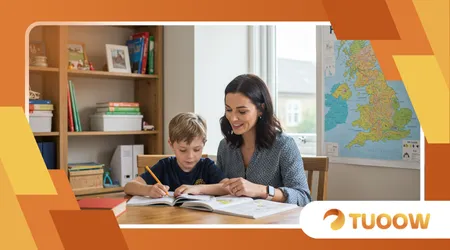Homeschooling in the UK: Rules and Resources for Beginners

Homeschooling in the UK has surged in popularity, offering parents a bespoke way to educate their children.
As traditional schooling grapples with funding shortages and rigid curricula, more families are turning to home education for flexibility and personalisation.
Recent estimates suggest over 180,000 children are now homeschooled in the UK, a number that has quadrupled since 2015.
This shift isn’t just a trend it’s a movement redefining education. Why are so many choosing this path?
Let’s explore the legal framework, practical resources, and real-world strategies for beginners navigating this transformative journey.
This guide is your roadmap to understanding homeschooling in the UK. We’ll unpack the rules, highlight essential resources, and share actionable insights for new homeschoolers.
From legal obligations to creative teaching methods, we’ll cover the essentials with clarity and depth.
Whether you’re driven by dissatisfaction with mainstream schools or a desire to tailor your child’s learning, this article will equip you with the tools to start strong.
Let’s dive into the world of home education with confidence and curiosity.
Understanding the Legal Landscape of Homeschooling in the UK
The UK’s legal framework for homeschooling in the UK is straightforward but demands diligence. Parents must ensure their child receives a full-time education from age five.
Unlike traditional schools, home education doesn’t require following the National Curriculum. This freedom allows tailored learning but comes with responsibility.
You must notify your local council if your child is withdrawn from school. Failure to provide a “suitable” education can lead to council intervention.
What constitutes a “suitable” education? The law is deliberately broad, focusing on age-appropriate learning that fosters development. Parents aren’t required to be qualified teachers.
Instead, they must demonstrate a plan whether structured or child-led that meets their child’s needs.
Local councils may request updates, but oversight remains light, especially in England. Scotland uses “home education” officially, with similar flexibility.
This light-touch regulation empowers parents but requires proactive planning. For example, Sarah from Leeds withdrew her son from school due to bullying.
++ Understanding the UK Curriculum: A Simple Guide for Parents
She created a portfolio of activities maths apps, museum visits, and online courses to satisfy council checks.
Her approach shows how flexibility can meet legal standards. Regular communication with your council builds trust and avoids scrutiny.
The lack of rigid rules is a double-edged sword. It grants freedom but can overwhelm beginners. To stay compliant, document your child’s progress.
Keep records of resources, schedules, and achievements. This not only satisfies councils but also helps you track growth. A simple spreadsheet or journal can make this process seamless.

Getting Started: Practical Steps for New Homeschoolers
Embarking on homeschooling in the UK feels like setting sail on uncharted waters. Begin by defining your educational philosophy.
Do you lean towards structured lessons or unschooling, where learning follows a child’s interests? Clarifying this shapes your approach.
Research local support groups online forums like Education Otherwise connect parents for advice and resources.
Next, assess your child’s needs and interests. For instance, Tom, a Manchester parent, noticed his daughter thrived with hands-on science experiments.
Also read: New Immigration Rules Explained: What’s Changing This Month
He built a curriculum around practical activities, blending free online resources with affordable kits. Start small: choose one or two subjects to focus on initially. This prevents burnout and builds confidence.
Budgeting is critical. Homeschooling in the UK can be cost-effective, with free resources like BBC Bitesize offering worksheets for ages 11–16.
However, exams like GCSEs require private centre fees, often £100 £200 per subject. Plan these costs early. Used bookstores or charity shops can supply affordable textbooks.
Time management is another hurdle. Create a loose schedule that balances learning and play.
A typical day might include two hours of focused study, interspersed with activities like cooking to teach fractions. Flexibility is key adapt to your child’s rhythm. Trial and error will refine your routine.
Don’t overlook socialisation. Arrange meetups with other homeschooling families or enrol your child in extracurriculars like theatre or sports.
These connections counter the myth that homeschooled children lack social skills. Local councils often provide lists of homeschooling groups, making it easier to network.
Read more: Parliament News: Key Bills Being Debated in June
Top Resources for Homeschooling Success
The wealth of resources for homeschooling in the UK can feel overwhelming, but quality trumps quantity. BBC Bitesize offers free, curriculum-aligned materials for all ages, from phonics to GCSE prep.
Khan Academy provides interactive lessons in maths and science, perfect for self-paced learning. Both are cost-free and reliable.
For structured curricula, Oak National Academy delivers video lessons and worksheets tailored to UK standards.
If you prefer secular resources, Twinkl offers downloadable packs for KS1–KS4, covering diverse subjects. Parents in Touch and K5 Learning provide free worksheets for core subjects, ideal for beginners.
Books are invaluable. “How to Home Educate” by Heidi Steel, a UK-based educator, offers practical tips for new homeschoolers.
Libraries often stock homeschooling guides and textbooks. Online communities like Home Education UK’s forum share free resources and lesson plans, fostering collaboration.
Technology enhances learning. Apps like Duolingo for languages or Scratch for coding engage tech-savvy kids.
For hands-on learners, consider science kits from Thames & Kosmos, available for under £30. These tools make abstract concepts tangible, sparking curiosity.
Don’t ignore local resources. Museums, libraries, and community centres often host free workshops or homeschooling days.
For example, the Science Museum in London offers interactive sessions that align with STEM learning. Combining digital and local resources creates a rich, varied curriculum.
Addressing Challenges and Misconceptions
Homeschooling in the UK faces scrutiny, with critics citing limited social exposure or academic rigour. Yet, studies show homeschooled children often outperform peers academically.
A 2013 study found UK homeschooled students scored 15–20% higher on standardised tests than school attendees. This challenges the notion that home education lacks structure.
Socialisation concerns are another myth. Homeschooled kids join clubs, sports, and group activities, building diverse friendships.
For instance, Emma in Bristol organises weekly homeschool meetups at a local park, where kids collaborate on projects. These interactions rival school-based socialising, fostering confidence and teamwork.
The biggest challenge is parental self-doubt. Beginners often worry about “doing enough.” Combat this by setting clear goals and celebrating small wins.
If your child masters a new skill, like writing a short story, it’s progress. Trust your instincts and seek advice from experienced homeschoolers.
Time and financial pressures can strain families. Homeschooling in the UK requires no formal qualifications, but exam costs add up.
Budget carefully and explore free resources to offset expenses. Time management improves with practice start with short, focused sessions to avoid overwhelm.
Regulation varies across the UK. England’s light oversight contrasts with stricter Welsh guidelines, where councils may request detailed plans.
Stay informed about your region’s rules to avoid surprises. Joining a local homeschooling network provides clarity and support.
Building a Support Network and Community
Connection is the heartbeat of homeschooling in the UK. Local groups, like those listed on Home Education UK, offer meetups and resource swaps.
Online platforms, such as Facebook groups, connect parents nationwide, sharing tips and encouragement. These networks are lifelines for beginners.
Collaborate with other families. Organise group outings to historical sites or science centres, blending learning with socialising.
For example, a Hampshire group runs monthly “history walks,” where kids explore castles while parents discuss curricula. These events enrich learning and build community.
Engage with professionals. Tutors from Teachers To Your Home can supplement teaching for tricky subjects like A-Level physics.
Libraries and museums often provide free workshops tailored for homeschoolers. These partnerships lighten the load and enhance learning.
Mentorship from seasoned homeschoolers is invaluable. Reach out to experienced parents for advice on navigating council checks or choosing resources.
Their insights can prevent common pitfalls, like overcommitting to a rigid schedule. A mentor’s guidance feels like a compass in uncharted territory.
Don’t isolate yourself. Attend homeschooling conferences, like the UK Home Education Conference, to learn from experts and connect with peers.
These events spark inspiration and remind you you’re not alone. Building a network transforms homeschooling from a solo endeavour into a shared journey.
SEO Strategies for Sharing Your Homeschooling Journey

Sharing your homeschooling in the UK experience online can inspire others and attract support. Start a blog using platforms like WordPress, optimised for keywords like “home education UK.”
Write engaging posts about your journey, such as “A Week in Our Homeschool.” This draws organic traffic.
Use social media to amplify your voice. Share short videos on YouTube Shorts, which boast a 5.91% engagement rate, to showcase activities like science experiments.
Repurpose blog content into social posts to maximise reach. Consistency builds an audience over time.
Optimise content with on-page SEO. Include keywords naturally in titles, headings, and meta descriptions. For example, a post titled “Top Free Resources for Homeschooling in the UK” can rank higher on Google. Link to reputable sites like BBC Bitesize to boost credibility.
Collaborate with education blogs for guest posts. Pitch articles like “Why We Chose Home Education” to sites like Edumentors.
These backlinks improve your site’s authority. Engage with readers by responding to comments, fostering a loyal community.
Track performance using free tools like Google Analytics. Monitor which posts resonate, like a guide to GCSE prep, and refine your content.
SEO isn’t just technical it’s about sharing authentic stories that connect with families exploring homeschooling in the UK.
A Sample Homeschooling Schedule
| Time | Activity | Resource Used |
|---|---|---|
| 9:00–10:00 | Maths (fractions practice) | Khan Academy worksheets |
| 10:00–11:00 | Reading/Writing | Library books, journal prompts |
| 11:00–12:00 | Science (experiment) | Thames & Kosmos kit |
| 12:00–1:00 | Lunch + life skills (cooking) | Recipe-based maths activity |
| 1:00–2:00 | History (museum visit) | Local museum workshop |
This schedule balances academics and hands-on learning, adaptable to your child’s pace.
Conclusion: Embracing the Homeschooling Journey
Homeschooling in the UK is a bold, rewarding choice that empowers parents to shape their child’s future. It’s not about replicating school at home but crafting a unique learning path.
From navigating legal requirements to tapping free resources, you have the tools to succeed. The journey, like a river carving its own course, demands adaptability but yields profound rewards.
Start small, stay curious, and lean on your community. Whether it’s a coding app or a museum trip, every step builds your child’s potential.
As you embark on this adventure, ask yourself: what kind of learning will unlock your child’s brilliance? With dedication, homeschooling in the UK can be transformative.
Frequently Asked Questions
Do I need qualifications to homeschool in the UK?
No, parents don’t need formal qualifications. You must provide a suitable education, tailored to your child’s needs, with regular council updates.
How do I handle GCSE exams for homeschooled children?
Register your child at a private exam centre. Costs range from £100–£200 per subject. Plan early to secure spots.
Are there free resources for homeschooling?
Yes, BBC Bitesize, Khan Academy, and Twinkl offer free, high-quality materials for all ages, covering core subjects and beyond.
How do I ensure my child socialises?
Join local homeschooling groups, enrol in extracurriculars, or organise group outings. These foster friendships and collaborative learning.
What if my local council questions my homeschooling?
Provide a clear plan, including resources and progress records. Regular communication and documentation demonstrate compliance and commitment.
